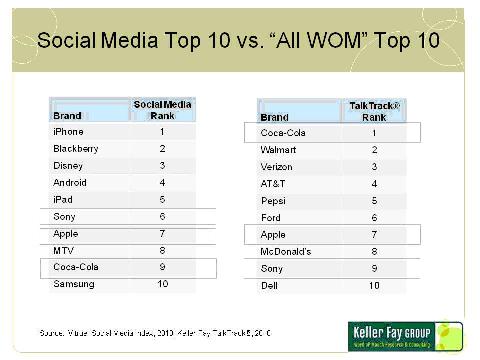Social Brands: A Tale of Two Worlds - Ed Keller

Monitoring consumer conversations that take place on social media is becoming increasingly prevalent. Among the major benefits are that there is a lot of conversation that can be monitored in real time, and it is unstructured and authentic. It has become a critical tool for PR/corporate communication practitioners and customer service organizations. Companies which excel in quick response have gained competitive advantage. Best Buy's Twelpforce is an excellent case in point, and was awarded top honors (the "WOMMY Grand Prix") by WOMMA for the best word of mouth campaign of 2010.
But when it comes to the use of social media as a market research tool, there remain important, but generally unexplored, questions. Yes, as the world's largest focus group, or mass ethnography, there is a treasure trove to be mined. But given that more than 90% of word of mouth takes place offline, not online, raises the question: Do the conversations about brands that take place via social media represent the larger conversation that takes place in living rooms and around the water cooler at work? If your business wants to be benefit from better consumer "listening" – as we believe it should – is it sufficient to focus your listening efforts exclusively (or even primarily) around social media? The answer is no.
First, there is the question of who is "talking" via social media. While the numbers of Facebook and Twitter users is undeniably huge, research from Forrester shows that when it comes to "peer influence" a very small minority of people (6%) account for the vast majority (80%) of all brand impressions on social networks. The voices that can be "heard" via social media are not those of the masses, but a select few who speak regularly.
Further, recent research by marketing professor Renana Peres of Wharton shows that the distribution of brands being discussed online is heavily concentrated in just a few sectors – two-thirds are about media/entertainment, automotive, and technology. Conversations that take place offline, in contrast, are more evenly distributed across many categories.
Now, to add further to our understanding of the representativeness of brand conversation via social media is a new analysis by my firm, the Keller Fay Group, in which we compare "the most talked about brands of 2010" (factoring in both offline as well as online conversation) with the "most social brands of 2010," as measured by Vitrue, a social media management company. Here are some of the highlights.
· Only three brands are on the top 10 for both lists – Sony, Apple and Coca-Cola.
· Only six brands are in the top 20 on both lists (the three mentioned above, plus Samsung, Ford and iPod.
· Looking across the ten most "social brands," the average ranking when it comes to "all" word of mouth is 81. The biggest disconnect is Android, which is the 4th most "social brand" but drops to #397 on the list of most talked about brands offline and online.
Many decades ago, straw polls were the primary way that the public's views on presidential elections were measured. The most famous of all was the Literary Digest poll, in which millions of readers sent in post cards saying how they would vote. Famously, in 1936, the Literary Digest forecast that the Republican Alf Landon would beat FDR. Meanwhile, Gallup and Roper, using far smaller samples drawn using scientific sample techniques, correctly forecast the outcome and achieved national recognition as a result. The Literary Digest went out of business shortly thereafter.
The message here is not that brands which use social media for research purposes are making a mistake. It can be a very valuable listening post. The mistake comes only when the users of such research assume that social media is reflective of the larger set of conversations that take place about your brands. You need to listen holistically, not selectively. You don't want your brand to go the way of the Literary Digest or Alf Landon.
Ed Keller, CEO of the Keller Fay Group, has been called "one of the most recognized names in word of mouth." The publication of Keller's book,The Influentials, has been called the "seminal moment in the development of word of mouth." Ed can be contacted at ekeller@kellerfay.com.
Read all Ed’s MediaBizBloggers commentaries at WOM Matters.
Check us out on Facebook at MediaBizBloggers.com
Follow our Twitter updates @MediaBizBlogger
MediaBizBloggers is an open-thought leadership blog platform for media, marketing and advertising professionals, companies and organizations. To contribute, contact Jack@mediadvisorygroup.com. The opinions expressed in MediaBizBloggers.com are not those of Media Advisory Group, its employees or other MediaBizBloggers.com contributors. Media Advisory Group accepts no responsibility for the views of MediaBizBloggers authors.



